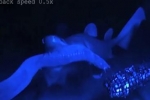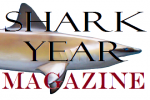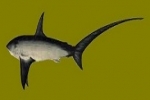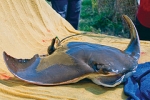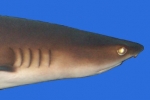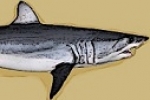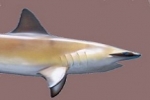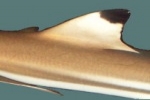Scientists film hagfish anti-shark slime weapon
Scientists film hagfish anti-shark slime weapon
Virginia College studies the diet of Cownose Rays
Local College Dives into Diet of Cownose Stingrays By Lauren Compton, WSET.com 24. October 2011 Lynchburg, VA – A local college is trying to solve a Chesapeake Bay controversy by finding what cownose stingrays eat. The answer could be the key to saving the animals from the bay workers trying to get rid of
Humane Society Grant for Study on Thresher Sharks in Australia
2011 Marine Science Grant from the Humane Society International Winner: Matthew Heard, Flinders University Project: Assessment of the vulnerability of thresher sharks (Alopias spp.) to commercial and recreational fisheries Media Release: for immediate release Publication: «Newspaper» Date: 10 October 2011 A Bedford Park winner for $7,000 young scientist grant Bedford Park resident, Matthew Heard was recently announced as
Radioactive Materials found in Elasmobranchs in Fukushima Japan
Results of the inspection on radioactive materials in fisheries products (Aug 2011) Radioactive Caesium (Bq/kg) : Provisional regulation value for fish – Radioactive caesium: 500 Bq/kg Radioactive Iodine (Bq/kg) : Provisional regulation value for fish – Radioactive iodine: 2000 Bq/kg Results for Elasmobranch Species : Origin: Iwaki City, Fukushima Prefecture. Sampling Date: 26 July, 2011
Researcher Uses Satellites to Track Cownose Ray
By Janet Krenn, Virginia Sea Grant, 28. September 2011 Cownose rays are native to the Chesapeake Bay. They arrive late spring when the waters start warming and leave again in the early fall as waters cool. Where they go during the rest of the year? No one knows! That’s why Virginia Sea Grant Fisheries and
New Analysis confirms Sharks are in trouble
New Analysis confirms Sharks are in trouble Great Barrier Reef
Shark Compound Proves Potential as Drug to Treat Human Viruses
News Release by the Georgetown University Medical Center FOR IMMEDIATE RELEASE: September 19, 2011 Contact: Karen Mallet Scientist suggests that squalamine be explored as a human antiviral agent based on the reported discovery and its known safety profile in humans WASHINGTON — A compound initially isolated from sharks shows potential as a unique broad-spectrum human
Molecule from shark cartilage fights joint pain
London, 18. Sep 2011 (IANS) Chondroitin, a molecule sourced from shark cartilage and pig ears, has emerged as a wonder remedy for joint pains, says a study. Small studies have found that arthritic sufferers taking chondroitin require only fewer pain killers — yet larger trials proved inconclusive. Now a study, from the Geneva School of
Post-release survival of captured mako sharks
Post-release survival of captured mako sharks: developing best-practice for sustainable catch and release game fishing. Supervision Team: Dr Jayson Semmens (IMAS) Dr Jeremy Lyle (IMAS) Mr Barry Bruce (CSIRO) Mr Paul Rogers (SARDI) Project Outline Short-fin mako sharks (Isurus oxyrinchus) are top predators in marine ecosystems and have widespread distributions in temperate and tropical waters
Special Meeting on Sharks Information Collection in Southeast Asia
15-17 September 2011 Bangkok, Thailand Background Shark is one of the important taxa concerned by international organization what increase magnitude to force the fishers on conservation issues in recently years. Furthermore, sharks are widely utilized in term of shark fin, flesh, skin including other products. With the biological scientific facts and market-related consumption, the International
Mote receives NOAA grant for shark fishing study
By Robin Hartill | City Editor 22. August 2011 The National Oceanic and Atmospheric Administration (NOAA) has awarded Mote Marine Laboratory a $192,000 grant to study how sharks fare after anglers release them. In the study, Mote scientists will record fine-scale movements of released sharks in unprecedented detail, using accelerometers, or tags with motion-sensing technology,
Study of juvenile hammerhead nursery grounds begins in Costa Rica
Mision Tiburon begins study of juvenile hammerhead nursery grounds in Golfo Dulce, Costa Rica MigraMar, 15 August 2011. In June 2011, Mision Tiburon, one of the Costa Rican partners of Migramar, placed ten ultrasonic tags on juvenile hammerheads in Golfo Dulce, and installed three receivers in a key nursery ground This tagging expedition is part
Loss of Large Predators Has Caused Widespread Disruption of Ecosystems
News Release by Scripps Institution of Oceanography / University of California, San Diego. Thursday, July 14, 2011. Scripps scientists part of research team studying cascading effects on ecosystems The decline of large predators and other “apex consumers” at the top of the food chain has disrupted ecosystems all over the planet, according to a review of
Reef Sharks and Coral Reefs Symposium
19 July 2011. Announcing the mini-symposium ” Reef Sharks and Coral Reefs ” at the 12th INTERNATIONAL CORAL REEF SYMPOSIUM, Cairns, Australia, 9-13 JULY 2012. In July 2012, the 12th ICRS will welcome over 2,500 delegates from around to world to the tropical city of Cairns to attend 1,500 talks and posters presenting the latest
Record number of great white sharks tagged in NZ waters
07 July 2011 Press Release by the National Institute of Water & Atmospheric Research (NIWA). Scientists completed a successful three-week field tagging trip in April 2011, where they tagged a record 27 great white sharks around the Titi (Muttonbird) Islands off the northeast coast of Stewart Island. The National Institute of Water and Atmospheric Research

